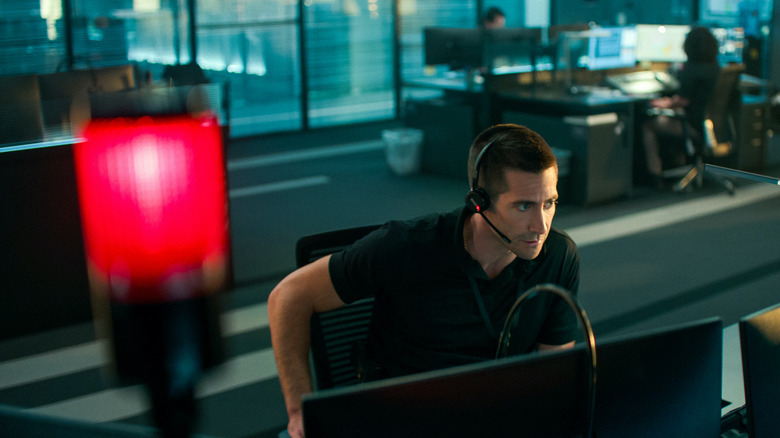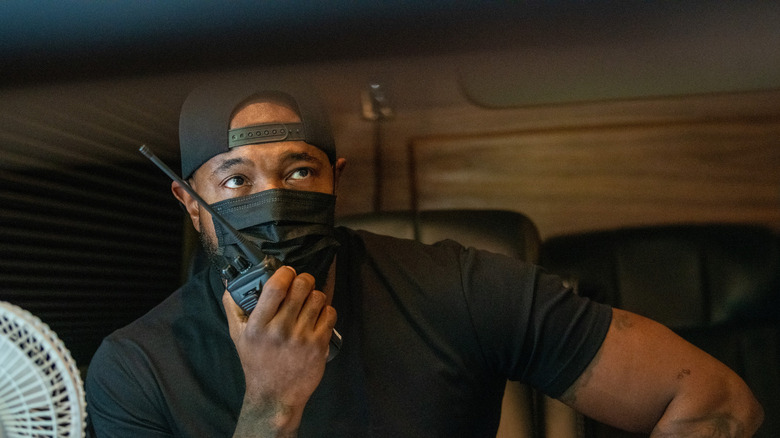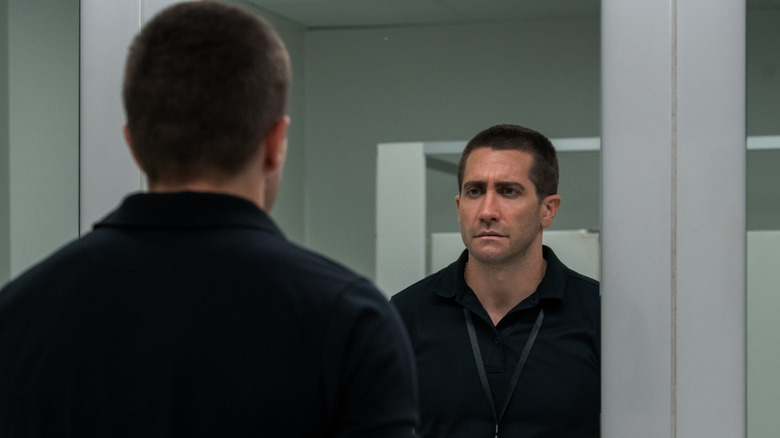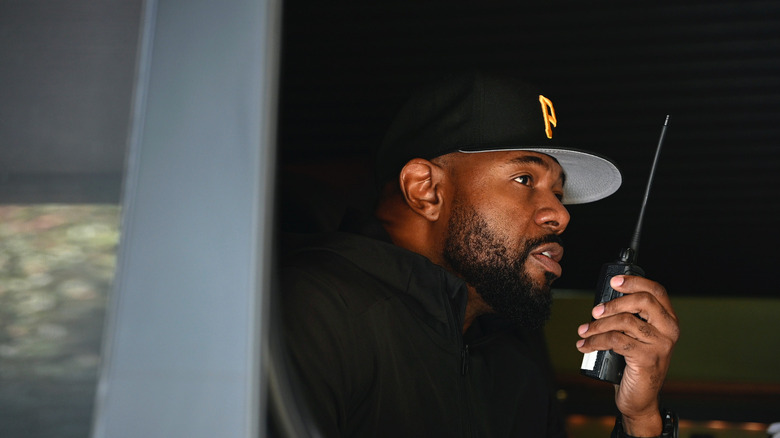Jake Gyllenhaal And Antoine Fuqua On Filming The Guilty Using Unorthodox Pandemic Methods [Interview]
Star Jake Gyllenhaal and director Antoine Fuqua transport the 2018 Danish film "The Guilty" to the states, remaking the film through a distinctly American eye. During the Toronto International Film Festival, /Film sat down (virtually) with Gyllenhaal and Fuqua to discuss the unorthodox way the film was shot and how they grafted modern American toxic masculinity onto the story to better reflect the world we're living in today. And since it was shot during the pandemic, Fuqua put safety first and directed the whole thing remotely, from a van. "The Guilty" will have a limited theatrical release on September 24, 2021, before heading to Netflix on October 1, 2021.
"It's not ideal."
So I read that this was directed from a van. I wanted to hear more about that. Both what it was like directing from a van, and what it was like being directed from a van.
Antoine Fuqua: It's not ideal. I didn't sign up to do that in our business, but we didn't sign up for Covid, either. It was just one of those situations. The quick down and dirty story is we were a few days away from filming, we were taking all the precautions to protect everybody who at the height of covid. Someone close to me tested positive, I tested negative, but of course, that still meant that I couldn't go on the set. The whole movie was threatened to be shut down. Because we shot the movie in 11 days, and that's the whole quarantine time, pretty much. So we put our heads together, me and Jake and the team, and came up with this van that we were going to try to hardwire from outside the studio, a block away, where I would just be in the van, stuck, can't move, monitors, computers, people on zoom, spycam on the set, watching the whole thing. And all my communications with everybody I need to communicate with, and private lines for myself and Jake. And all the other actors from all around the world were on computers, on Zoom. So literally me and Jake would get to talk to each other face to face only from the other side of the wall. He would climb up on the ladder, on the other side of the wall, and we would talk like Romeo and Juliet, back and forth every once in a while. And then that was it. He'd go back in and we would communicate basically through that system. I still haven't seen Jake face to face up to this day, but it was interesting because I started to feel the way his character was feeling. I was trapped. I couldn't leave. I was in a van with my monitors and my stuff. He was trapped in the room. He couldn't leave with his monitors and everything. So it started to make sense and the energy and the frustration from that started to come into the picture. Plus when we left there, we were still trapped, because of COVID. It wasn't like you could go out to dinner and have a nice time and have a drink with your friends, decompress. You have to go back to your perspective home and then next day back to the set in the same situation. So it wasn't ideal, but creatively, I think it turned out to be a positive, and kept everyone safe. That's the down and dirty version.
Jake Gyllenhaal: Being directed in that way was definitely a first. The physical proximity, and the intimacy of getting direction, getting close to you, telling you what someone needs, or moving to someone in space, those types of things, they were gone. We really were totally isolated from each other. So the whole movie in a lot of ways was dictated by technology. Everything was dictated by technology, even the performances, they were all on zoom and they were being cued by the first AD. But Paul Dano was in Australia, Ethan Hawke in New York, Peter Sarsgaard in New York, we got Riley Keough in Los Angeles, so zoom, as you can see and as we know, it creates its own rhythm, it dictates your rhythm almost. And so we were just consumed by and subsumed by technology and trying to make a very human story. This movie is defined by that process.
Antoine Fuqua: But as you say, acting is about listening. Directing is about listening as well. It makes everybody pay closer attention to everything because that's all you got. So when I communicate with Jake and we really just talk, I have to be very specific because I wasn't standing there with my DP. I had to be very specific with the lenses and everything else. So it really sort of became one of those things where the focus had to be a needlepoint focus because we also were trying to get it done in a time where we keep everybody safe, in 11 days. The more time we're on set, the more times there's a misinterpretation of something, or the camera's in the wrong place, or the wrong lens, or whatever's happening, the chances of somebody being exposed. Mainly Jake, because he's the one with the mask off because he has to do the performance. So everything has to be very precise.
"How hard could it be?"
You mentioned the actors were calling in by Zoom. Were you acting with them live? You were getting those performances live — they were literally calling in?
Jake Gyllenhaal: We broke the movie up into five parts, 20 pages each, and all the actors would be scheduled within those days knowing the hours they were working. So they were all on zoom and we would rehearse and choreograph the sequence. We didn't have actual calls coming in, but we knew over, let's say the 20 pages, there were 10 calls that came in, four of them are ones I made and then six of them ones coming in. And we knew the pattern of that, so did first AD, and then so did the other actors. And he would cue them on zoom, and then I would either dial and then wait for a ring and we would decide, oh, is it one ring? Is it two rings? Does it pick up immediately? And then sometimes Antoine would say, "let that ring longer." He'd watch a take and go, "let that ring for four rings." And then I'd wait, and wait, and wait, as acts we'd wait, and then we would start to scene. It was all very choreographed, but then you'd meet weird technical difficulties. You'd hear your voice repeating over and over again in the middle of a take, you get 10 minutes in and it'd be going beyond fire. And then all of a sudden it just literally would be on fire. You'd be like, I can hear my voice, someone's repeating, or, [does impression of phone line breaking up] "it- is- a- m- sit- wor-" and you're like, "oh, f**k." I mean, and that would, that would constantly happen, but it was all these beautiful mistakes made for responses and reactions, and it was quite a process.
That's much more complicated than I expected it to be.
Antoine Fuqua: Me too.
That makes everything in the movie seem more impressive.
Jake Gyllenhaal: Yeah, you're like, why don't they just call in? How hard could it be?
"We are struggling with who we are right now."
So how important was the original movie to you guys? Did either of you study that, or were you more interested in making this your own thing? How did you guys approach the original movie compared to what you were doing here?
Antoine Fuqua: I read the script first and I was hooked on the story, the thriller of it, the mystery and everything. And then I watched the original, and I love the original, I do. It has a European feel, a little different. I obviously wanted to make this our own. Joe is somebody I related more to, obviously because of my relationship with Jake. And also, I know guys like that, Jake knows guys like that, in that line of business policing, military, all those sort of high risk businesses. So I wanted to make it more relatable to us here in the United States. The male masculinity that we understand a little bit more, that we witness every day. So that part of it was really exciting for me.
Jake Gyllenhaal: When I saw the original film, I immediately thought this needs to be transposed into an American context. I'm not really even quite sure why I felt that. I just felt like very rarely does a movie communicate something that... yes, I think the original film is brilliant. In fact, I'm developing another movie with Gustav and we're good friends, and he's very happy with this movie. And he's been along the ride with us from the beginning, but I think the necessity of putting a story like this, like Antoine said, about masculinity, about our perceptions of each other, about our misconceptions, about our projections, about what we think we see or what we assume we see when we hear a voice, how mistaken we can be about people and what we assume. All those ideas, particularly in our culture right now, told through, clearly, a very thrilling, very intense story that's entertaining. It just felt almost necessary in an American context. You can make the argument in a cinematic world, the first one is fantastic, what's the reason to do it so soon? And it's because everything in this story is a story, really in a lot of ways, about America right now. And I think both Antoine and I felt that way.
Antoine Fuqua: Yeah. We're dealing with some serious mental illness issues that we're not talking about.
Can you elaborate on that just a little bit more?
Antoine Fuqua: Well, if you look at America at the moment, especially American men we are struggling with who we are right now. We've got a lot of things happening where we're trying to redefine what it means to be a man, for sure. And then if you're in a business like policing or military, look, a lot of guys who just came back from Afghanistan, a lot of those guys have killed themselves. There are some issues, there are some things that are happening, that we're not really talking about. It's almost like a bad word. And now you're starting to see more athletes even come out to talk about mental illness. We're trying to get our heads and our arms wrapped around a problem and we're witnessing so much violence, mainly by men, mass shootings. There is something wrong, you just can't say evil or corrupt. There's something else that I think we have to all deal with in this country. Why is that happening? So if you study any mass murderer or anybody like that, there's always one thing in life that made them the way they are. It's like, "hey, he murdered somebody and he would always take the red shoes and stick them under the bed." Because somewhere in his life, his mother was doing something crazy, and she had red shoes when he was a kid. There's always a reason for the behavior. And then America, what is our reason for this behavior? Especially with men, what's really going on right now? So I think that Gustav's film, to me, is a masterpiece. This film was more about exploring masculinity in America, violence in America, the system in American, mental health in America, as well as the thrill of it all in the fun of it all. But those are the subjects that me and Jake talk a lot about.
Jake Gyllenhaal: Yeah. I think that it's very clear that, we talk about our systems of communication, how even in trying to make a movie through them, how many faulty things happened and our problems in terms of just making a movie. And then you think about miscommunications in an actual emergency, in situations where you're dealing with someone who clearly, in this story and a number of people in this story, are dealing with serious mental health issues. And no one knows how to handle those things within the system and they may know how to handle them, but the system does nothing to help that, or makes it very hard to be helped. So I think somewhere looking underneath this movie in almost every one of the phone calls, there are hints of all of these questions. And I think we both felt, and we talked about this a lot, that it was very important that... It landed in our laps in a way without really realizing it, as all great things do when you're making something, it's something you need to learn, obviously. But the time, I handed this to Antoine in July 2020?
Antoine Fuqua: Yeah, July.
Jake Gyllenhaal: The country and the world is going through more than we've ever gone through in so long, and the world was. We just felt it was in our bones to put it within an American context and tell the story.



